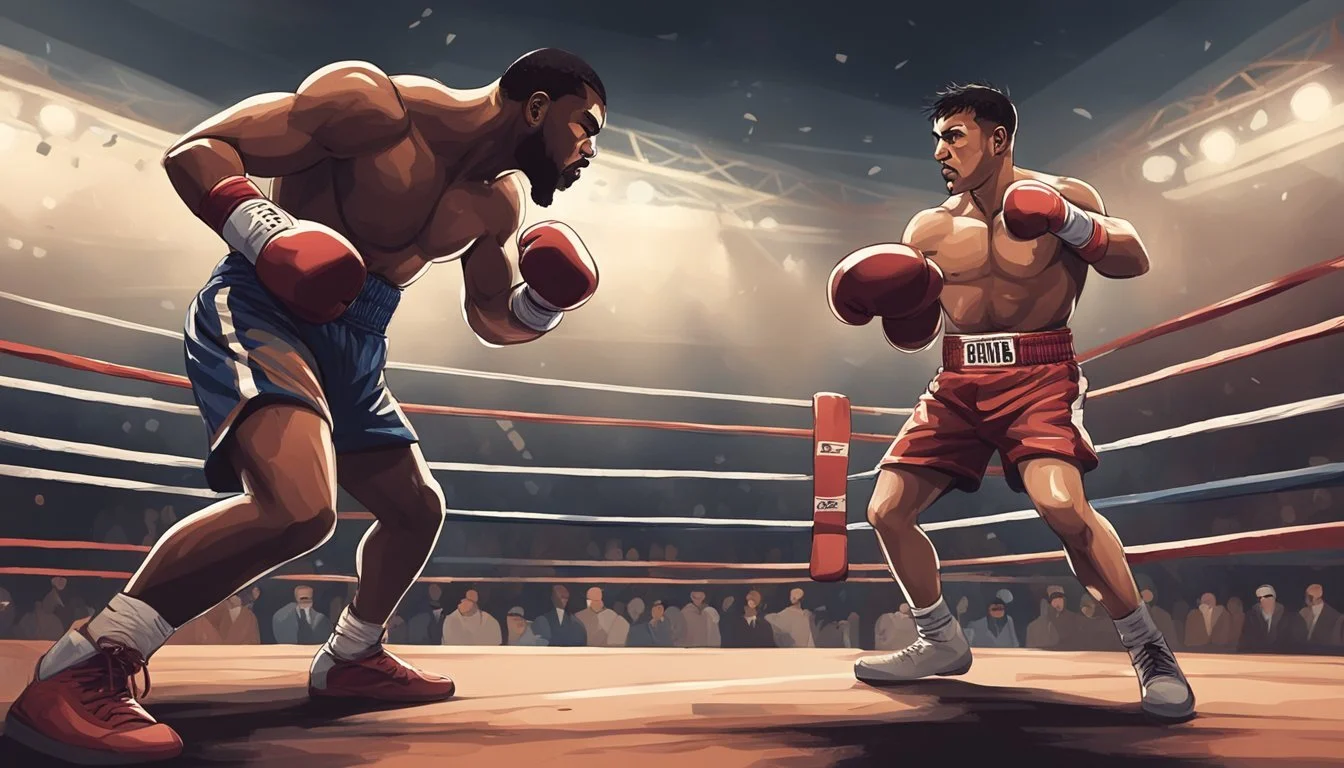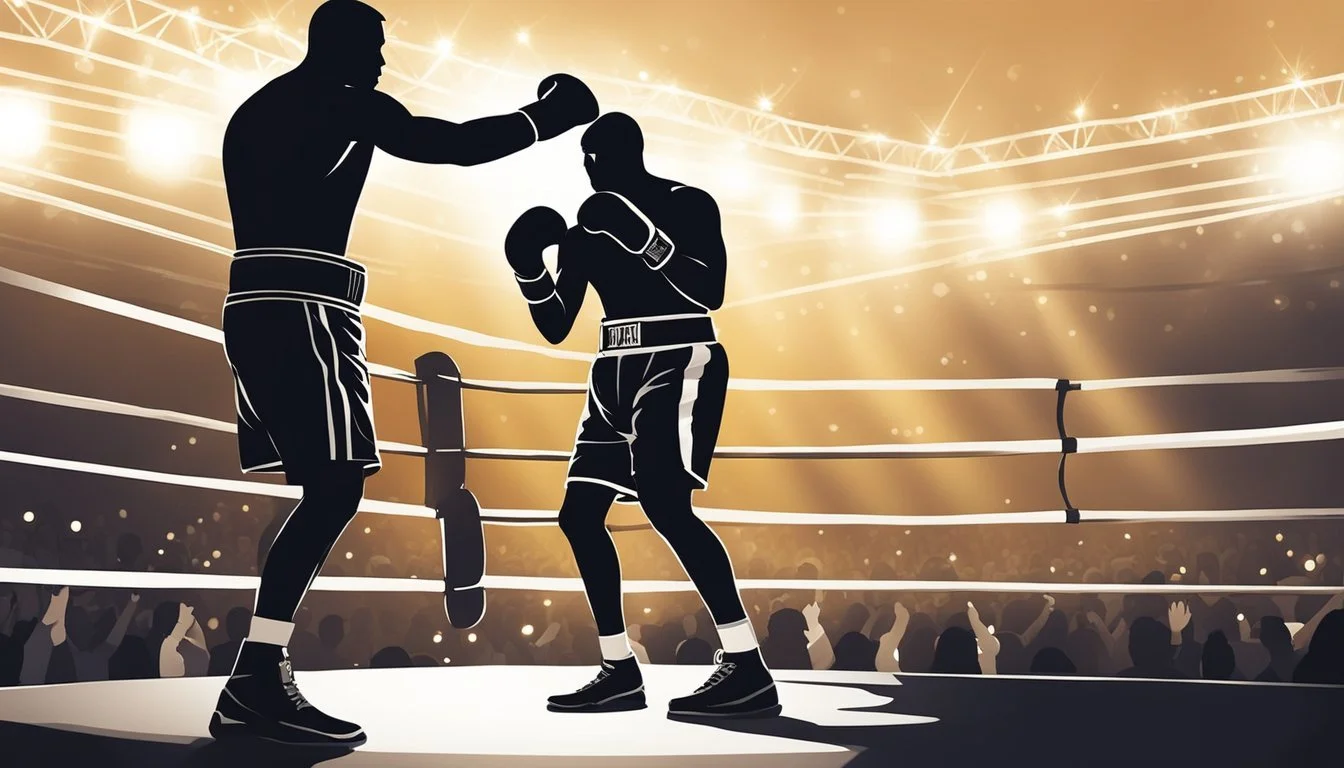The Real Rocky: Chuck Wepner's Inspiring Boxing Career
From Underdog to Hollywood Muse
Chuck Wepner's boxing career inspired one of the most iconic film franchises in cinematic history. The New Jersey heavyweight fought his way from regional titles to a championship bout against Muhammad Ali in 1975. Wepner's gritty performance against Ali, in which he knocked down the champ and lasted nearly 15 rounds, caught the attention of a young Sylvester Stallone and became the basis for the character of Rocky Balboa.
Known as "The Bayonne Bleeder" for his ability to absorb punishment, Wepner embodied the underdog spirit that resonated with audiences worldwide. He won the USA New Jersey State Heavyweight title in 1967 and faced several top contenders throughout his career. Wepner's journey from a liquor salesman to challenging the greatest boxer of his era exemplifies the American dream that Rocky Balboa would later personify on screen.
Wepner's life story extends beyond the ring, filled with colorful anecdotes and personal struggles that mirror the fictional Rocky's journey. His experiences have been chronicled in documentaries and the 2016 biographical film "Chuck," further cementing his place in boxing lore and popular culture.
Early Life and Entry into Boxing
Chuck Wepner's journey from the tough streets of Bayonne to the boxing ring shaped his future as a fighter. His upbringing and early experiences laid the foundation for a career that would later inspire the iconic Rocky character.
Growing Up in Bayonne, New Jersey
Charles Wepner was born on February 26, 1939, in New York City. At around one year old, he moved to Bayonne, New Jersey, where he was raised by his grandmother. Bayonne, a blue-collar town with a strong maritime presence, presented a challenging environment for young Wepner.
The city's demographics, comprised largely of dock workers and naval base personnel, fostered a culture where physical toughness was valued. Wepner later reflected on his childhood, stating, "This was a tough town with a lot of people from the docks and the naval base and you had to fight to survive."
The Beginnings of a Fighter
Wepner's boxing education began informally on the streets of Bayonne. The necessity to defend himself in this rough neighborhood honed his fighting instincts from an early age. These street fights served as impromptu training grounds, teaching Wepner the basics of hand-to-hand combat.
His natural toughness and ability to withstand punches became evident during these confrontations. These traits would later define his boxing style and earn him the nickname "The Bayonne Bleeder" due to his tendency to cut easily but keep fighting.
Amateur Boxing Highlights
Wepner's transition from street fighting to organized boxing marked the beginning of his formal career. He entered the amateur boxing circuit, where he quickly made a name for himself. His powerful punches and resilience in the ring caught the attention of local trainers and fight promoters.
During his amateur career, Wepner competed in numerous tournaments and matches. He steadily improved his technique and ring strategy, preparing for his eventual move to professional boxing. His amateur record, while not widely documented, demonstrated enough potential to launch his professional career.
Professional Career and Notable Fights
Chuck Wepner's boxing career spanned over a decade and included several high-profile matches. His journey from local tough guy to world title challenger captivated fans and left an indelible mark on boxing history.
Turning Professional
Wepner entered the professional boxing scene in 1964 at the age of 25. He fought his first pro match against George Cooper, winning by knockout in the third round. This victory set the tone for Wepner's early career, characterized by his toughness and ability to take punches.
In his first year as a pro, Wepner racked up an impressive record of 16-1-1. His style quickly earned him the nickname "The Bayonne Bleeder" due to his tendency to sustain cuts during fights.
Rise Through the Ranks
As Wepner climbed the heavyweight ranks, he faced increasingly challenging opponents. In 1967, he fought Buster Mathis, losing by technical knockout in the third round. This loss didn't deter Wepner, who continued to improve his skills and build his reputation.
In 1970, Wepner scored a significant victory over former WBA heavyweight champion Ernie Terrell. This win propelled him into the top 10 heavyweight rankings and set the stage for bigger opportunities.
Championship Aspirations
Wepner's championship dreams faced setbacks in the early 1970s. He lost to George Foreman in 1969 and suffered a defeat to Sonny Liston in 1970. Despite these losses, Wepner's perseverance kept him in contention for title shots.
His breakthrough came in 1974 when he defeated Terry Hinke, earning him a shot at the heavyweight title held by Muhammad Ali.
The Fight with Muhammad Ali
On March 24, 1975, Wepner faced Muhammad Ali for the world heavyweight championship. The bout took place at the Richfield Coliseum in Ohio. Wepner's performance exceeded expectations, lasting nearly 15 rounds against the legendary champion.
In the ninth round, Wepner knocked Ali down, though Ali claimed it was due to Wepner stepping on his foot. Despite his valiant effort, Wepner ultimately lost by technical knockout with just 19 seconds left in the final round.
This fight became the inspiration for the movie "Rocky," catapulting Wepner into pop culture fame.
Subsequent Matches
Following the Ali fight, Wepner's career took on new dimensions. He faced Andre the Giant in an exhibition match in 1976, losing by countout after being tossed out of the ring.
In 1978, Wepner fought his final professional bout against Scott Frank, losing by technical knockout in the 12th round. He retired with a respectable record of 35 wins (17 by knockout), 14 losses, and 2 draws.
Wepner's career, while not decorated with championships, was marked by his incredible toughness, determination, and the ability to capture the public's imagination.
Legacy and Influence
Chuck Wepner's boxing career left an indelible mark on popular culture and inspired one of cinema's most iconic characters. His story transcended the ring, resonating with audiences worldwide.
Inspiration for Rocky Balboa
Chuck Wepner's 1975 bout against Muhammad Ali served as the catalyst for Sylvester Stallone's creation of Rocky Balboa. Stallone watched the fight and was captivated by Wepner's underdog spirit. The fictional Rocky mirrored Wepner's blue-collar background and tenacious fighting style.
Like Wepner, Rocky was a relative unknown who got a shot at the heavyweight title. Both displayed remarkable resilience in the face of overwhelming odds. Wepner's ability to knock down Ali in the ninth round became a pivotal moment in the film.
The "Rocky" franchise went on to become a global phenomenon, winning three Academy Awards and spawning multiple sequels.
Beyond the Ring: Cultural Impact
Wepner's influence extended beyond inspiring a movie character. His story became a symbol of perseverance and the American dream. The "Bayonne Bleeder," as he was known, embodied the ethos of the everyman who refuses to quit.
His legacy lives on in boxing circles, where he's respected for his toughness and heart. Wepner's career highlights, including fights against Sonny Liston and George Foreman, are still discussed by boxing enthusiasts.
In his hometown of Bayonne, New Jersey, Wepner remains a local hero. His life story has been the subject of books, documentaries, and the 2016 film "Chuck," starring Liev Schreiber.
Retirement and Later Life
Chuck Wepner's post-boxing years saw him transition into new roles and pursuits. He focused on giving back to his community while maintaining connections to the sport that made him famous.
Life After Professional Boxing
Wepner retired from professional boxing in 1978 after a 14-year career. He took on various jobs, including working as a liquor salesman and security guard. His fame from the Ali fight and connection to the "Rocky" films brought opportunities for public appearances and speaking engagements.
Wepner faced legal troubles in the 1980s, serving a brief prison sentence. After his release, he worked to rebuild his life and reputation.
In 2003, Wepner sued Sylvester Stallone for using his life story as inspiration for the "Rocky" films without compensation. The case was settled out of court in 2006.
Philanthropy and Community Work
Wepner became active in charitable causes, particularly those benefiting youth and aspiring boxers. He frequently participated in fundraising events and boxing exhibitions for various charities.
In his hometown of Bayonne, New Jersey, Wepner remained a beloved figure. He supported local youth boxing programs and often spoke at schools about perseverance and overcoming challenges.
Wepner also advocated for better health care and support for retired boxers. He shared his experiences to raise awareness about the long-term effects of boxing on athletes' health.
Chuck Wepner's Fighting Style and Technique
Chuck Wepner earned the nickname "The Bayonne Bleeder" for his tough, brawling style and ability to absorb punches. His physical attributes and unorthodox tactics made him a formidable opponent in the ring.
Physical Attributes and Boxing Skills
Wepner stood 6 feet 5 inches tall with a solid build, giving him a significant reach advantage over many opponents. He utilized his size to wear down fighters and relied on his exceptional stamina to outlast them in long bouts.
Wepner's boxing skills were unrefined but effective. He threw powerful, looping punches and often fought from the outside. His left jab set up opportunities for his strong right hand.
Despite lacking finesse, Wepner compensated with raw toughness and an iron chin. He could absorb tremendous punishment and keep fighting, a trait that endeared him to fans.
Notable Matches and Tactical Approaches
Wepner's most famous fight came against Muhammad Ali in 1975. He employed a pressure-fighting style, constantly moving forward and trying to crowd Ali. In the ninth round, Wepner managed to knock Ali down with a body shot.
Against skilled boxers, Wepner often tried to turn matches into brawls. He would press opponents against the ropes, using his weight and strength to wear them down.
Wepner's cut-prone face meant he frequently fought through blood. This didn't deter him; instead, it seemed to fuel his determination. His ability to keep fighting while badly cut became a hallmark of his career.
Media Representations and Documentaries
Chuck Wepner's inspiring boxing career and connection to the Rocky franchise have been portrayed in various films, books, and documentaries. These works explore his life story and impact on pop culture.
Films and Books
Liev Schreiber starred as Wepner in the 2016 biographical film "Chuck." The movie depicts Wepner's life in the 1960s and 1970s, focusing on his famous fight with Muhammad Ali and the subsequent Rocky inspiration. It showcases his personal struggles and boxing career.
Several books have also chronicled Wepner's life. "The Real Rocky: The Chuck Wepner Story" by Mike Towle provides an in-depth look at the boxer's career and experiences. These works offer fans a deeper understanding of the man behind the legend.
Documentary Features
"The Real Rocky," a 2011 ESPN documentary directed by Jeff Feuerzeig, examines Wepner's life and career. It features interviews with Wepner himself, as well as insights from Sylvester Stallone and sports journalist Jerry Izenberg.
The documentary explores Wepner's famous bout with Muhammad Ali and its influence on the creation of the Rocky character. It also delves into Wepner's life after boxing, including his legal battles with Stallone over the use of his story.
These documentary features provide viewers with a factual account of Wepner's journey, complementing the fictional portrayals in films and books.
Personal Challenges and Triumphs
Chuck Wepner faced numerous obstacles during his boxing career and personal life. His journey was marked by both setbacks and moments of resilience.
Overcoming Obstacles
Wepner's boxing career began in the Marine Corps, where he honed his skills as an amateur. After leaving the military, he worked various jobs to support himself while pursuing boxing professionally. Wepner earned the nickname "The Bayonne Bleeder" due to his tendency to cut easily in fights.
Despite this physical disadvantage, he persevered and became known for his toughness and ability to withstand punishment in the ring. Wepner's most famous bout came in 1975 when he faced Muhammad Ali for the heavyweight title.
Although he lost the fight, Wepner managed to knock Ali down in the ninth round, a moment that would later inspire Sylvester Stallone to create the character of Rocky Balboa.
Legal and Personal Battles
Following his retirement from boxing, Wepner faced several personal and legal challenges. In the 1980s, he struggled with substance abuse issues and spent time in prison for drug-related offenses.
After his release, Wepner worked to turn his life around. He found stability in his third marriage to Linda, who helped him overcome his past troubles. Wepner also pursued legal action against Sylvester Stallone, claiming he was owed compensation for inspiring the Rocky character.
The lawsuit was eventually settled out of court. In recent years, Wepner has embraced his legacy as the real-life Rocky, participating in documentaries and supporting the 2016 biopic "Chuck," which starred Liev Schreiber as Wepner.




